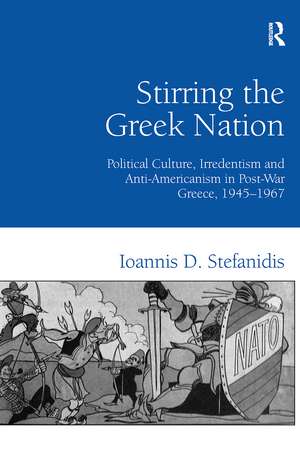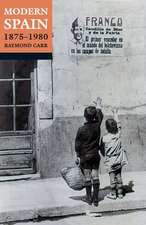Stirring the Greek Nation: Political Culture, Irredentism and Anti-Americanism in Post-War Greece, 1945–1967
Autor Ioannis Stefanidisen Limba Engleză Hardback – 28 sep 2007
Preț: 1054.71 lei
Preț vechi: 1286.24 lei
-18% Nou
Puncte Express: 1582
Preț estimativ în valută:
201.81€ • 210.71$ • 167.03£
201.81€ • 210.71$ • 167.03£
Carte tipărită la comandă
Livrare economică 04-18 aprilie
Preluare comenzi: 021 569.72.76
Specificații
ISBN-13: 9780754660590
ISBN-10: 0754660591
Pagini: 316
Dimensiuni: 156 x 234 x 19 mm
Greutate: 0.45 kg
Ediția:1
Editura: Taylor & Francis
Colecția Routledge
Locul publicării:Oxford, United Kingdom
ISBN-10: 0754660591
Pagini: 316
Dimensiuni: 156 x 234 x 19 mm
Greutate: 0.45 kg
Ediția:1
Editura: Taylor & Francis
Colecția Routledge
Locul publicării:Oxford, United Kingdom
Cuprins
Contents: Preface; Introduction; Greek foreign policy: the domestic nexus; The post-war irredentist revival; The first Cyprus campaign; The political culture of enosis; The second Cyprus campaign; The Cyprus question and the origins of anti-Americanism; The growth of anti-Americanism; Discontent and the impact of the second Cyprus crisis; (National) pride and prejudice; Surveys; Epilogue; Sources; Index.
Notă biografică
Ioannis Stefanidis is Assistant Professor in International Studies/Law at Aristotle University of Thessaloniki, Greece.
Recenzii
’With this new book, Stefanidis has made in important contribution to the study of anti-Americanism in Greece.’ hirledview.typepad.com ’... a stimulating and exemplary work that combines thematic significance, empirical richness, and political engagement.’ The American Historical Review 'This is a revealing monograph and a much-needed contribution to the literature, as far as irredentism and Greek behaviour regarding Cyprus are concerned. It also provides insight on Greek anti-Americanism, which contrary to irredentism is still very much alive in Greece until this very day.' Historein
Descriere
This work examines the background to Greek nationalist politics and its effects on public opinion towards international events and territorial claims, from the end of the Second World War to the collapse of the constitutional rule in 1967. It explains how intermittent public mobilisation on various foreign policy issues created a 'political culture' that combined elements of nationalism, religion, race and stereotypes about the national Self and the Other. Drawing on a huge variety of sources including the Greek press, this book provides a fascinating account of Greek political culture and national self image at a crucial time in the country's political development.















